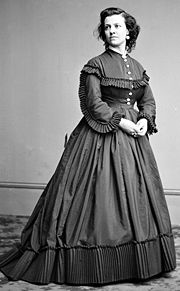| Actress Becomes Rosecrans' Spy |
 |
|||
|
from
Driftwood of the Stage, |
||||
| Among
the women of America who made themselves famous during the rebellion
was Pauline Cushman. While playing at Wood's Theater, Louisville, Ky., in March, 1863, she forsook the stage and entered the Federal service as a scout and spy, and was at once detailed to carry orders between Louisville and Nashville. She was subsequently employed by General Rosecrans, and for many months attached to the Army of the Cumberland. She visited the Confederate lines time after time, and rendered her country invaluable service. She was twice taken prisoner, but managed to escape without giving away any of the secrets entrusted to her by the Federal government. It was just after Nashville was taken that the little woman was captured while making a trip near that city. Again she managed to escape only to be recaptured the following morning. They held to her this time and found in her garters papers which proved conclusively that she was a scout and spy. Arrangements were being made to hang her when the Union forces marched into the town and took possession. For meritorious services she was given the brevet of major, and afterward became known in theatrical circles as Major Pauline Cushman. |
||||
|
Learn more about the life of Pauline
Cushman: Spy of the Cumberland, a book by William Christen and in Pauline Cushman in Wikipedia |
||||
| Horton also tells of these actresses: | ||||
| At one time Adah Isaacs Menken became
interested in military affairs and was elected captain of a company at Dayton, Ohio. On her travels her commission as an officer was placed on exhibition in the lobbies of the theaters where she played, and attracted much attention. During one of her engagements at Albany, N.Y., she paid a visit to the armory of the Twenty-fifth Regiment of that city, and was hospitably received. At her benefit a few days later, she sang a song dedicated to that regiment. During the civil war she frequently got in hot water by expressing herself a little too freely as a secessionist. She was very fond of decorating her rooms with Confederate flags every- where she went. While playing at Baltimore, then under military rule, she was arrested and placed under guard during the reign of Provost Marshal Fish, but was treated with consideration on account of her manifold charms of manner and person. Charlotte Crampton abandoned the stage when informed that her son had enlisted in the Union army for the war. Although at that time more than a middle-age woman she became a vivandiere, and followed her boy's regiment through the campaign. |
||||
| Return to General Rosecrans |
(12/01/2009) |
|||